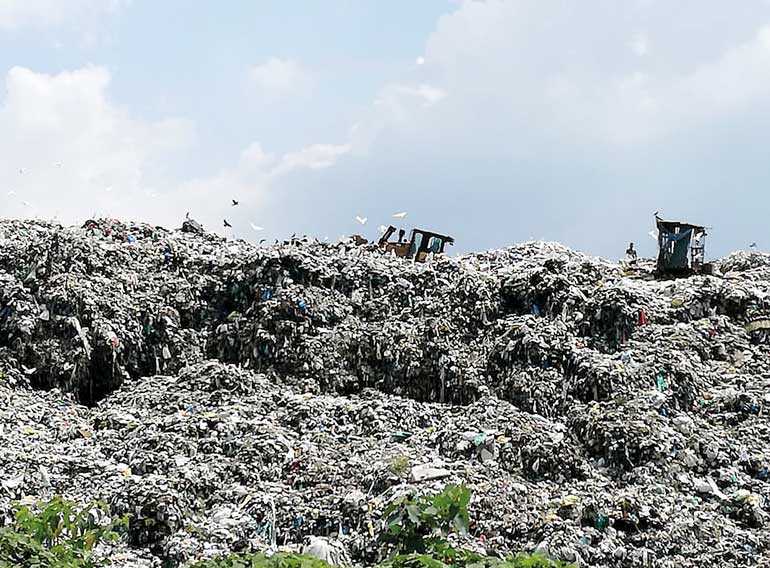Tuesday Feb 17, 2026
Tuesday Feb 17, 2026
Monday, 23 December 2019 00:38 - - {{hitsCtrl.values.hits}}

Observing the landfill in more detail one could see that some of the waste there could have been recycled, upcycled and reused instead of dumped. Where it was great to see the organic waste being composted, the sheer amount of inorganic waste which is delivered by a never-ending line of trucks and tractors leaves one sad and frustrated – Pic by Sabine Samarawickrema
Few weeks ago I visited one of Colombo’s landfills. Where I am aware that Sri Lanka generates much less waste than many Western countries, it is still overwhelming to experience mountains of waste: next to natural water ways, the people working on the landfill, the residents living close by, … just everything seems so wrong about a huge mountain of manmade waste in the middle of Sri Lanka’s otherwise so beautiful countryside.
In many countries, waste is managed so well, citizens cannot see it. They are consuming at a large scale without ever understanding their individual impact on the environment and society. In Sri Lanka we only manage about half the waste we generate, so we can see the issue in our daily life. Nevertheless, when standing on top of the landfill, I realised that each and every person should once in their lives visit a landfill, visit a recycling business, visit factories where different products are created … Nowadays we live so much off the supply chain and off nature that we are completely unaware of how products derive at our table and houses and where they go once we discard them. 
Observing the landfill in more detail one could see that some of the waste there could have been recycled, upcycled and reused instead of dumped. Where it was great to see the organic waste being composted, the sheer amount of inorganic waste which is delivered by a never-ending line of trucks and tractors leaves one sad and frustrated.
From the landfill, Colombo can be seen, with its now beautiful decorations and sales going on. It is the festive season and we all get into the mood for shopping, decorating and searching for gifts. Now in fact the festive days have drifted off far from the original cause, which for Christmas is to celebrate the birth of Jesus, like it happened with many ceremonial occasions, it has globally become a shopping Eldorado and commercial hot spot.
We love to celebrate and we love to gift and decorate, nothing wrong about that. Maybe we can however rethink of how we are doing that and choose some more sustainable alternatives.
Christmas tree: There had been a long discussion about which Christmas trees are more sustainable, artificial or natural ones. Based on the 0-waste logic we’d like to say the reusable ones, made out of wood/plastic (i.e. drift wood can be upcycled into a tree); in case that long lasting materials are used. Those advocating for natural Christmas trees have a point in mentioning that during their lifetime they generate oxygen and they are farmed, so natural forests are not impacted. However those trees can only be used once and no matter how much oxygen, looking at the piles of discarded Christmas trees early January still breaks an environmentalist’s heart. At least these trees should be upcycled to other products or used as firewood in case they had not been chemically treated before, to last longer. Besides these options, the most sustainable choice would be to buy a tree in a pot and decorate it for Christmas, where after the festive season, the tree can be either kept for next year or planted.
The old year has almost passed, a new one is starting soon. Let us take a stand and try our best to reduce our waste footprint to a minimum in 2020. Let us be aware of our own impact on this planet and do our individual best to reduce unnecessary purchases, waste and therefore, future challenges
Decorations: In terms of decorations it’s all about reusing. Instead of natural candles, fairy lights can be used; instead of plastic glitter balls, one can select paper or wood and natural items which can be collected such as small pine cones, or coconut shell pieces. In simple terms: it is key to refuse everything which cannot be reused, breaks easily and does not degrade.
Gift wrapping: Using recycled paper or newspaper is an alternative way to reduce the waste of gift wrappings. Also, reusable bags/paper bags or containers are a more sustainable way of bag gifts.
Cards: For all those overseas one can use e-cards to send season’s greetings, and for those near paper cards are available from many charities to support a cause when buying their Christmas cards. Overall, a card crafted yourself with a small drawing might be more appreciated than a commercial glitter card.
Having a look at gifts, many of us are challenged to find the right present for our loved ones. Being invited to various events gifts are needed and one easily heads out to source something suitable during Christmas sales and markets. To avoid frustration, waste of money and cluttering the other person’s house, one can think of gifting:
Experiences: What do we all know is the most previous gift we can share? Time! What do we regret the most in times of loss and being separated from loved ones? That we would have spent more time with them. To gift experiences is a blessing for you and the other. This can take the form of attending an event together, visiting a restaurant or spending a day out somewhere. It can be in the form of a dinner invitation at home, a movie or a voucher for a spa treatment. It can also include a service such as babysitting, dog sitting, repairing something or just helping out in the house. Experiences include anything which the giver and presentee can enjoy together and does not need to include purchasing any material product. In fact experiences will be remembered a lifetime – who of us remembers which gifts we got the past so many years?
Donations: For those friends where we know they care much about a cause, we can gift donations on their behalf. This can be to plant trees, support elderly homes or other institutions and organisations which are in real need for financial support.
Sustainable gifts: In Sri Lanka we have an array of sustainable potential gifts available, including reusable bags/straws/cutlery/plates, sustainable jewellery and accessories, home utensils and clothing. When choosing a present, why not buy from one of the businesses who focus on environmental conservation, social impact and a good cause. This can also take the form of raising awareness on sustainable development related awareness challenges and solutions available including documentaries, books or tickets for related exhibitions and events. Finally, choose gifts which have less packaging to reduce wastage.
Vouchers: Whenever being not sure about the other person’s preferences, vouchers are the best option to prevent gifts from remaining unused or in the worst case discarded.
Food: Finally, celebrations are always linked to food. Globally one-third of the food we produce, is wasted. Thinking of all those who do not have enough to eat, this is a devastating situation. When choosing dishes for Christmas and restaurants to celebrate, we should place importance on not to order too much, out of the urge to celebrate ‘in style’, however only purchase what we can actually eat. When celebrating at home, we can ask invitees to take home the remaining food or gift it to a home/neighbours or an organisation which looks after the hungry.
The old year has almost passed, a new one is starting soon. Let us take a stand and try our best to reduce our waste footprint to a minimum in 2020. Let us be aware of our own impact on this planet and do our individual best to reduce unnecessary purchases, waste and therefore, future challenges.